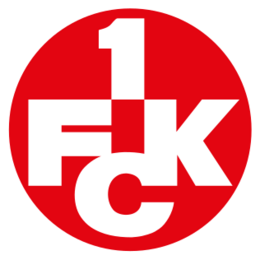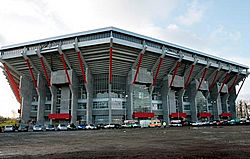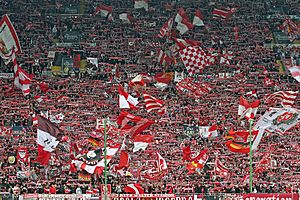1. FC Kaiserslautern facts for kids
 |
||||
| Full name | 1. Fußball-Club Kaiserslautern e. V. | |||
|---|---|---|---|---|
| Nickname(s) | Die roten Teufel (The Red Devils) | |||
| Founded | 2 June 1900 | |||
| Ground | Fritz-Walter-Stadion | |||
| Capacity | 49,327 | |||
| Owner | Fußball-Club Kaiserslautern e.V. (45%) Saar-Pfalz-Invest GmbH (45%) U.S. consortium (10%)
Chien Lee
Pacific Media Michael Kalt Krishen Sud Randy Frankel |
|||
| Board Member | Rainer Keßler (Chairman) Johannes Benjamin Remy (Deputy) |
|||
| Head coach | Torsten Lieberknecht | |||
| League | 3. Liga | |||
| 2020–21 | 3. Liga, 14th of 20 | |||
|
||||
1. FC Kaiserslautern, often called FCK or just Lautern, is a famous German sports club. It is located in Kaiserslautern, a city in Rhineland-Palatinate. While best known for its football team, the club also has other sports sections.
The club was formed on June 2, 1900, when two older clubs, Germania 1896 and FG Kaiserslautern, joined together to create FC 1900. Over the years, it merged with other clubs and finally became 1. FC Kaiserslautern in 1933.
FCK was one of the first teams in the Bundesliga, Germany's top football league, when it started in 1963. They played in this league without a break until 1996. The club has won four German championships, two German Cups (DFB-Pokal), and one German Supercup. This makes them one of Germany's most successful football clubs.
They even reached the UEFA Champions League quarter-finals in 1999 and the UEFA Cup semi-finals twice. FCK won their first Bundesliga title in 1991. In the 1997–98 season, they made history by winning the German championship as a newly promoted team, which no other team has done since.
After being in the second division for six years, they were relegated to the 3. Liga for the first time in 2018. However, in 2022, Kaiserslautern earned promotion back to the 2. Bundesliga after winning a playoff match.
Since 1920, their home stadium has been the Fritz-Walter-Stadion. It was named in 1985 after Fritz Walter, a legendary player who led West Germany to win the 1954 World Cup. Fritz Walter played his entire career for Kaiserslautern.
Contents
Club History
Early Years and World War II
Before the current club was formed, some of its early teams, like Bavaria and FC 1900 Kaiserslautern, played in important leagues. FC 1900 Kaiserslautern even won the first league title in 1908. The new FV Kaiserslautern team finished second in their league in 1910 and 1912.
During the 1930s, the club played in different top-level leagues. Their performance got better after 1939. In the 1941–42 season, Kaiserslautern won their division title. This allowed them to play in the national championship for the first time. They were defeated by the strong team Schalke 04.
League games stopped in 1945 because of World War II.
After the War: New Beginnings
After World War II, football leagues slowly started up again in Germany. 1. FC Kaiserslautern began playing in the Oberliga Südwest in 1945. They quickly became a very strong team.
In 1947, they won their group, with star players Fritz and Ottmar Walter scoring many goals.
Success in the 1950s and Joining the Bundesliga
This period marked the start of Kaiserslautern's great success in the Oberliga Südwest. They won the division title an amazing eleven times in twelve seasons. FCK reached Germany's first national final after the war in 1948, but lost.
Kaiserslautern became a top team in Germany in the early 1950s. They won their first German championship in 1951. They won a second title in 1953. They also reached the final in 1954 and 1955 but lost both times.
Five players from Kaiserslautern were part of the West Germany squad that won the 1954 FIFA World Cup in a famous match known as "The Miracle of Bern."
Kaiserslautern lost the 1961 German Cup final to Werder Bremen. However, they won their division again in 1963, just before the Bundesliga was created. This meant they earned one of the 16 spots in Germany's new professional football league.
They were runners-up in the German Cup in 1972, 1976, and 1981. They also reached the UEFA Cup semi-finals in 1982. The club finally won the German Cup in 1990. The very next season, they won their first Bundesliga championship. Both of these victories happened under manager Karl-Heinz Feldkamp.
1996 to 2004: Ups and Downs
1. FCK won their second German Cup in 1996. But just one week before the Cup final, they were relegated to the 2. Bundesliga after finishing 16th in the top division. At that time, Kaiserslautern was one of only four original Bundesliga teams that had never been relegated.
FCK quickly earned promotion back from the 2. Bundesliga in 1997. Then, under coach Otto Rehhagel, they did something incredible: they won the national championship immediately after being promoted! This was a unique achievement.
They also played in the 1998–99 UEFA Champions League. They won their group but were knocked out in the quarter-finals by fellow German team Bayern Munich.
Around 2001, Kaiserslautern faced serious financial problems. The club's leaders had to leave. A new president, Rene C. Jäggi, sold the Fritz-Walter-Stadion to help the club. A new coach, Erik Gerets, helped the team avoid relegation.
In the 2003–04 season, the club received a penalty of three points from the German Football Association due to financial issues. Coach Gerets was replaced by Kurt Jara. Jara left before the season ended.
2005 to Today
In 2005, Michael Henke became coach. The team started well but then struggled. Henke was replaced by Wolfgang Wolf. Wolf brought in many young players. At the end of the 2005–06 season, FCK was relegated to the 2. Bundesliga again. They stayed there for nine years.
In 2007, Kjetil Rekdal became the new head coach. After only three wins in 19 games, Rekdal was replaced by Milan Šašić in February 2008. In April 2008, Stefan Kuntz became chairman. With new leadership, the club avoided relegation to the new 3. Liga on the very last day of the 2007–08 season.
Šašić was dismissed in May 2009 after a series of poor results. Alois Schwartz took over as interim coach. The club then hired Marco Kurz as head coach.
Under Kurz, the club was promoted back to the 1. Bundesliga on April 25, 2010, after four years in the second league. At the start of the 2010–11 season, FCK had a great start, including a 2–0 win over Bayern Munich. However, they later struggled but managed to finish in seventh place.
In the 2011–12 season, the club finished last and was relegated to the 2. Bundesliga. They remained in that division until 2018, when they were relegated to the 3. Liga for the first time in the club's history.
In March 2022, a group of investors from the U.S. bought 10% of the club.
On May 24, 2022, four years after dropping to the third division, Kaiserslautern was promoted back to the 2. Bundesliga.
In the 2023-24 season, Kaiserslautern had an exciting run in the German Cup. They won against several teams, including a Bundesliga side, to reach the DFB-Pokal final. This was their first final in 21 years! They narrowly lost 1-0 to the Bundesliga champions Bayer 04 Leverkusen.
Reserve Team
The club also has a reserve team, 1. FC Kaiserslautern II. This team plays in lower leagues and helps develop young players. They have won the Southwestern Cup three times. Through this cup, they qualified for the DFB-Pokal three times. In 1997–98, they even played against their own first team in the DFB-Pokal, losing 5–0.
Team Kits
| Years | Kit manufacturer | Shirt sponsor |
|---|---|---|
| 1984–85 | Adidas | Karlsberg |
| 1985–87 | Erima | |
| 1987–89 | Trigema | |
| 1989–91 | OKI | |
| 1991–94 | Uhlsport | |
| 1994–96 | Adidas | |
| 1996–98 | Crunchips | |
| 1998–99 | Deutsche Vermögensberatung | |
| 1999–03 | Nike | |
| 2003–09 | Kappa | |
| 2009–10 | Do You Football | |
| 2010–11 | Allgäuer Latschenkiefer | |
| 2011–14 | Uhlsport | |
| 2014–15 | paysafecard | |
| 2015–16 | Maxda | |
| 2016–18 | Top12.de | |
| 2018–20 | Layenberger | |
| 2020–2024 | Nike | Allgäuer Latschenkiefer |
| 2024– | Castore | Novoline |
Recent Seasons and Achievements
Here's a look at how 1. FC Kaiserslautern has performed in recent seasons:
| Season | Division | Rank | P | W | D | L | GF | GA | GD | Pts | DFB-Pokal | UEFA Cup Winners' Cup | UEFA Cup/Europa League | UEFA Champions League |
|---|---|---|---|---|---|---|---|---|---|---|---|---|---|---|
| 2020–21 | 3. Liga | 14 | 38 | 8 | 19 | 11 | 47 | 52 | −5 | 43 | 1R | — | — | — |
| 2021–22 | 3. Liga | 3 | 36 | 18 | 9 | 9 | 56 | 27 | +29 | 63 | 1R | — | — | — |
| 2022–23 | 2. Bundesliga | 9 | 34 | 11 | 12 | 11 | 47 | 48 | −1 | 45 | 1R | — | — | — |
| 2023–24 | 2. Bundesliga | 13 | 34 | 11 | 6 | 17 | 59 | 64 | −4 | 39 | RU | — | — | — |
| 2024–25 | 2. Bundesliga | 7 | 34 | 15 | 8 | 11 | 56 | 55 | +1 | 53 | 2R | — | — | — |
- Key
P = Played; W = Win; D = Draw; L = Loss; F = Goals for; A = Goals against; GD = Goal difference; Pts = Points; Cup = DFB-Pokal; CWC = European Cup Winners' Cup; EL = UEFA Europa League; CL = UEFA Champions League.
– = Not attended; 1R = 1st round; 2R = 2st round; 3R = 3rd round; 1/8 = Round of sixteen; QF = Quarter-finals; SF = Semi-finals.
Club Honours
1. FC Kaiserslautern has won many titles throughout its history:
League Titles
Cup Titles
|
Regional Titles
Youth Titles
|
Home Stadium
FCK plays its home games at the Fritz-Walter-Stadion. This stadium was first built in 1920. In 1985, it was named after the famous player Fritz Walter. The stadium is built on a steep hill called "Mount Betze."
The stadium can hold 49,327 fans. It was one of the venues for the 2006 FIFA World Cup, hosting five matches. For the World Cup, the stadium was greatly improved with new stands and a roof.
Club Culture and Fans
The Fritz-Walter-Stadion is known for its loud and passionate fans. The most dedicated supporters gather in the "Westkurve" (West Curve) section of the stadium. This area used to be shaped like a semicircle behind the goals.
Kaiserslautern has friendly relationships with clubs like FC Metz, 1860 Munich, VfB Stuttgart, Werder Bremen, and Kilmarnock F.C. from Scotland. They have strong rivalries with Waldhof Mannheim and Bayern Munich. They also have local rivalries with Eintracht Frankfurt, and more recently, with Mainz 05 and Karlsruher SC.
Players
Current Squad
|
|
Famous Former Players
Many great players have played for 1. FC Kaiserslautern. Some of the most well-known include:
- Fritz Walter
- Ottmar Walter
- Werner Liebrich
- Horst Eckel
- Andreas Brehme
- Mario Basler
- Olaf Marschall
- Stefan Kuntz
- Michael Ballack
- Miroslav Klose
- Ronnie Hellström
- Ciriaco Sforza
- Youri Djorkaeff
- Lincoln
- Thomas Dooley
Coaching Staff
Other Sports at the Club
Besides football, 1. FC Kaiserslautern also has departments for many other sports, including:
Basketball Team
The club's basketball department started in 1952. Their senior men's team played in the second German Basketball league from 2002 to 2007. As of the 2014–15 season, both the men's and women's senior teams play in the fourth division.
Boxing Team
The boxing department has been part of the club since its early days. Some famous boxers from the club include Emil Schulz, who won a silver medal at the 1964 Summer Olympics, and Reiner Gies, who won a bronze medal at the 1988 Summer Olympics. Karl Mildenberger, who later became a European heavyweight champion, also boxed here before turning professional.
Images for kids
-
Fritz Walter, a legendary player for FCK and Germany.
-
Andreas Brehme, another famous player who played for FCK.
See also
 In Spanish: 1. FC Kaiserslautern para niños
In Spanish: 1. FC Kaiserslautern para niños
 | Anna J. Cooper |
 | Mary McLeod Bethune |
 | Lillie Mae Bradford |






